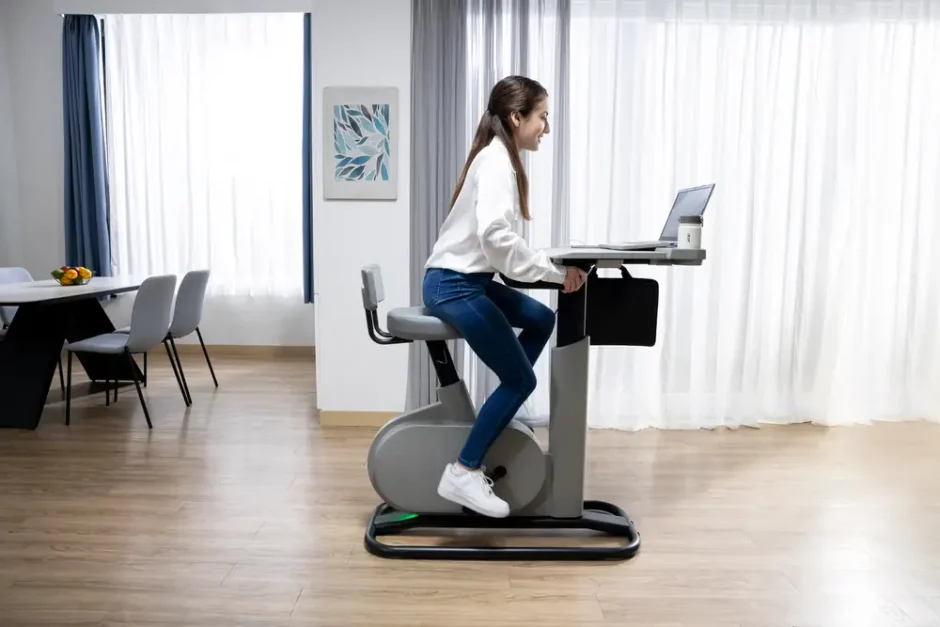Acer, the Taiwanese electronics giant unveiled a “bike desk” this week, called eKinekt, for people who want to work while on their exercise machine, in a product offering for multitaskers in a post-pandemic world. Acer released the bike desk, dubbed the eKinekt BD 3, in Las Vegas at this year’s annual Consumer Electronics Show (CES), touting it as a desk combined with a stationary bike for “sustainable and healthier lifestyles”.
The eKinekt BD 3 bike desk takes the kinetic energy from the pedaling to power a generator, creating electrical energy as long as you keep exercising.
“One hour of constant cycling at 60 RPM on the bike desk can generate 75 watts of self-generated power,” Acer says.
That should be enough to charge a laptop and a smartphone. However, it doesn’t seem you’ll find a standard electrical outlet on the desk. Instead, it comes with two USB-A ports and one USB-C port.
An LED on the back of the bike will light up signaling when devices are charging. Cycling at a somewhat leisurely pace of 60 RPM (revolutions per minute) for an hour can generate up to 75 watts of power, according to Acer. Converting that to kilowatt-hours (assuming you use those 75 watts in an hour) and plugging it into the EPA’s Greenhouse Gas Equivalencies Calculator, you might prevent emissions equivalent to walking rather than driving 0.132 miles in a gas-fired car.
Resultantly, it is not a whole lot of avoided pollution or clean energy. For context, the iPhone 13 Pro Max can draw close to 30 watts from the wall with a fast charger and juice up fully in under 90 minutes.
Acer’s bike desk has two USB Type-A ports and one USB Type-C port to plug multiple devices into at once — and doing so just might motivate a tougher workout. The bike desk can function in “Working” or “Sports” mode.
The rider can sit upright on the bike while typing — or push the desktop further back to make space to lean forward and intensify the workout. It also comes with a smartphone app for users who want to know how long they’ve been cycling, how many calories they burned, and the number of watts they generated.
The desk comes with two modes.
“In Working Mode, the desk surface moves closer to the chair to let riders sit in an upright position while typing and pedaling,” Acer says. “In Sports Mode, the desktop sits further forward, giving more room to lean in, similar to the position on a standard bike or trainer, for added leg space and increased pedaling power.”
To keep the user motivated, Acer developed a companion app for the desk that can show how many calories are burned, along with the electricity produced. Exercise stats will also show up on a built-in LCD display.
One of the key innovations is that the desk turns kinetic energy from cycling into an electrical charge to power electronic gadgets, such as laptops or smartphones, according to the Taiwanese company.
The work mode brings the desk closer to the seat, allowing riders to sit more comfortably for working and cycling. Switching to the sport model allows the device to function more like a standard exercise bike, according to the company. Acer did not give an exact launch date or say which regions it will be available to.
The new product comes as the world emerges from three years of Covid restrictions, during which hybrid models of working from both home and the office have been adopted by many companies around the world.
However, with even China now reopening, more companies have been asking their employees to come back to the office, which may affect sales of the newly-released bike desk.
Hopefully, the computer company makes a decent enough bike to at least make the Kinect BD 3 a fun ride. At $999 when it’s scheduled to drop in North America in June, it’s certainly a pricey ride. Acer says the bike desk will also become available in Europe, the Middle East, and Africa in June and in Taiwan in April.
You might be able to try out similar contraptions, called “WeBike” cycling desks at rail stations and airports without dropping the same kind of cash. They’ve been peppered throughout Europe since at least 2014.
Read More:












